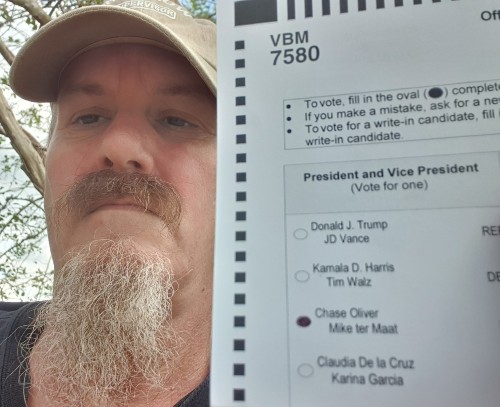
“Is it time to create a new political party in America,” Elon Musk asks in a Twitte … er, “X” … poll, “that actually represents the 80% in the middle?” As of this writing, 80.4% of respondents say “yes,” which seems to track well with whatever his definition of “the middle” might be.
He’s far from the first to suggest, or even try to organize, a “third” party, but the idea as he frames it is likely doomed.
America’s historical byways are strewn with the wreckage of “third” parties. Darcy G. Richardson’s book series on the phenomenon, “Others,” ably and engagingly documents that history, but there’s just so much of it that he’s only reached the era of the Great Depression after multiple volumes.
Why the long history of failure — the last “third” party to rise to power in the United States was the Republican Party, which replaced the Whigs in the 1850s, mostly over the issue of slavery?
Part of it is about how American elections work. They’re “first past the post plurality” elections, for single-representative districts. Whoever gets the most votes wins the seat, everyone else loses.
Duverger’s Law tells us that in such a situation, a maximum of two parties will win substantial power as fear of “vote-splitting” keeps voters stuck to perceived “lesser evils” that “can win.” Some parliamentary systems allow small parties to gain a few seats and hopefully grow; ours locks those small parties completely out.
But wait! What about “the 80% “in the middle?” Why don’t they just rise up and throw the Republican and Democratic bums out?
Because “the 80% in the middle” don’t really exist as a coalition or constituency with shared interests and positions, that’s why.
The large percentages of voters who describe themselves as “moderates” or “centrists” mean different things by those words.
One “moderate” or “centrist” supports robust Medicaid funding AND opposes subsidies for electrical vehicles.
Two doors down, another “moderate” or “centrist” wants Medicaid cuts AND wants that tax credit for his Tesla (looking at you, Elon).
Two MORE doors down, third and fourth “moderates” or “centrists” in the same household love, or hate, both Medicaid AND EV subsidies.
Keep going down the street and adding issues to the mix. There’s no especially large group that both feels the same way on all the issues and places the same level of importance on all the issues.
Those “moderates” and “centrists” end up picking the “major” parties that offer them the most, disagree with them the least, and might actually win.
The most “successful” third parties are 1) small and 2) ideological. Their supporters agree on a few principles, fight hard, lose almost every election, and occasionally move the needle on an issue with the public and the “major” parties (if you support same-sex marriage and/or legal marijuana, thank a Libertarian).
Always a bridesmaid, never a bride. That’s the story of “third parties” in America. Politics, for us, is the occasional new dress and unlimited drinks at the wedding reception. Elon won’t catch the bouquet either.
Thomas L. Knapp (X: @thomaslknapp | Bluesky: @knappster.bsky.social | Mastodon: @knappster) is director and senior news analyst at the William Lloyd Garrison Center for Libertarian Advocacy Journalism (thegarrisoncenter.org). He lives and works in north central Florida.
PUBLICATION/CITATION HISTORY


